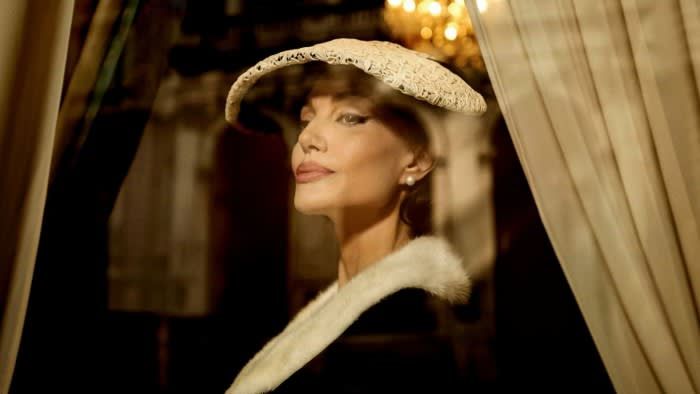Angelina Jolie makes a glamorous Callas in Pablo Larraín’s Maria — review

Access the Editor's Digest at no cost
Roula Khalaf, the person in charge of the FT, picks out her top stories for this weekly email.

Is it true that Maria Callas once set fire to a stack of her own costumes? The famous opera singer confirms that it happened. When her interviewer, who appears shocked and intrigued, asks why she did it, Callas responds coyly, refusing to give a clear answer. Later on, she shares the reason with him and scolds him for not being more persistent in his questioning.
Critics may say the same thing about Maria, a biographical film about Callas featuring Angelina Jolie that debuted at the Venice Film Festival. The movie primarily focuses on Callas's final days in a luxurious Paris apartment. This film is more reserved in its approach, especially considering the director, Pablo Larraín, known for his bold portrayal of Jackie Kennedy in a previous film. Writer Steven Knight, who worked with Larraín on Spencer, a fresh take on Princess Diana, also worked on Maria.
The choice of actress for the leading role was essential in bringing to life the character of a delicate, stunning, and shattered woman. Jolie successfully embodies the charm, intelligence, and deep emotion of “La Callas”, however, she maintains a sense of emotional distance. Despite this, there is a captivating element in seeing the iconic opera singer's voice being mimed by one of the most renowned faces in Hollywood. The creators hint that Jolie's actual singing voice may also play a part in the film.
Maria is a complex character, full of cleverness and conflicting desires. She tells her butler to reserve a table at a café where the staff recognizes her, wanting to feel praised. But when the café owner plays a Callas LP, she insists she never listens to her own recordings because a song should be performed live. However, in the next scene, we witness her intensely examining one of her live albums.
She is trying to find her previous voice and, more importantly, her former self. Memories in black and white and fuzzy colors show crowded opera houses, highlighting the now empty auditorium where she rehearses with a patient pianist (Stephen Ashfield) and the loneliness she feels. This is all that remains of her once successful career. Now, she sings for her maid (Alba Rohrwacher) while the sound of a frying pan fills the room, with the faithful Bruna praising her singing as "magnificent" even as the lapdogs bark.
Part of the reason for Maria's unhappiness can be attributed to Aristotle Onassis, portrayed in memories as a seductive person who pursued her while she was still married. However, the true origins of her struggles go back to her childhood in Nazi-occupied Greece and her difficult relationship with her mother. Her mother's behavior towards her as a child may have been a factor in Maria's eventual success. As Maria herself explains, music often comes from pain and difficulty, not from happiness.
The dialogue is full of these statements - at some point too many, making it seem like a carefully put together set of Callas sayings rather than authentic life experiences. The use of interviews is also excessive, which was used more sparingly in Jackie and Bradley Cooper's similar film about Leonard Bernstein, Maestro. In general, there is too much telling and not enough showing in this portrayal of a trapped singer.
When you watch a movie about Callas, you might think it will be full of drama and spectacle. Larraín, however, takes a different approach, with just a few fancy camera tricks, like when a crowd at the Eiffel Tower sings the Anvil Chorus from Il trovatore. The most memorable parts of the film are actually the quieter moments: like Maria revealing her true self during a card game with her team.
However, in the end, we are shown a final collection of clips that display the true essence of Callas. We see her expressing a wide range of emotions in a short amount of time, including warmth, innocence, sadness, weakness, lightheartedness, and happiness. It makes us question whether Jolie playing Callas is the right choice. Perhaps a production like Maria in Angelina: The Opera would have been more fitting.
The festival will be ongoing until September 7th. Check out labiennale.org/cinema for more information.











































